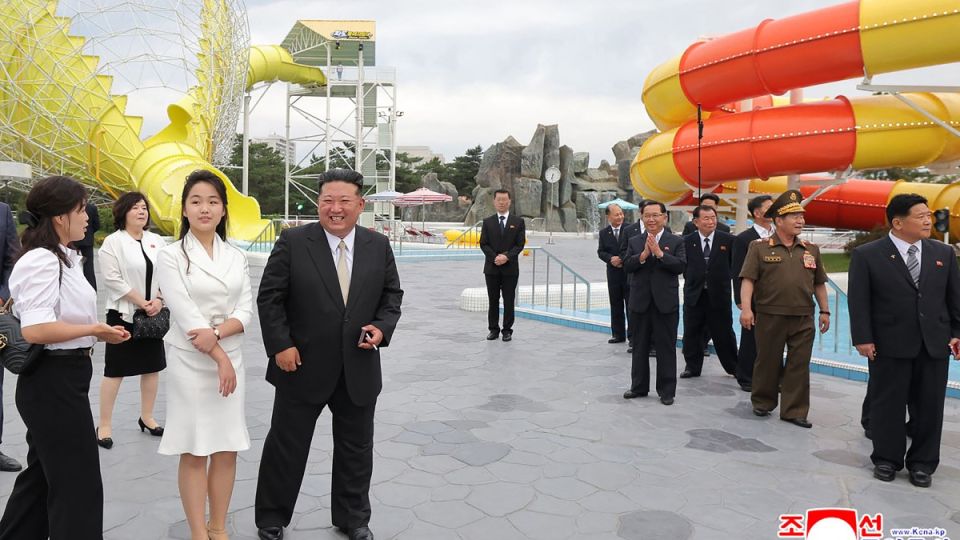June 27, 2025
SEOUL – North Korea is expected to court Russian tourists following the official completion of its Wonsan-Kalma coastal tourist zone, which is set to open first to domestic travelers in July, South Korea’s Unification Ministry said Thursday.
The ministry also noted that construction — which had been suspended for an extended period — resumed last year, possibly with material support from Russia and the expectation of attracting Russian tourists.
North Korean state media reported Thursday on the completion ceremony of the Wonsan-Kalma beach resort, held Tuesday and attended by leader Kim Jong-un, his wife Ri Sol-ju, their daughter, widely believed to be Kim Ju-ae, and his sister Kim Yo-jong.
Ri made her first public appearance since attending a New Year’s Day music concert in 2024.
The resort is set to open to domestic visitors on July 1, the state-run Korean Central News Agency said.
KCNA reported, “The tourist zone equipped with hotels and inns capable of accommodating around 20,000 people, allowing domestic and international visitors to choose accommodations that suit their preferences” in a Korean language report.
Russian Ambassador to North Korea Alexandr Matsegora and his embassy members were invited as special guests, according to the state media report.
“Operations are expected to gradually expand to include Russian tourists, beginning with domestic tourism on July 1,” a Unification Ministry official said on condition of anonymity during a closed-door briefing.
“The fact that the Russian ambassador was invited and highlighted (in the state media report) also appears to have been intended with Russian tourists in mind.”
The official further explained, “North Korea has regarded tourism as very important while recognizing it as a key means of earning foreign currency.”
“Tourism itself is not a violation of sanctions. However, tourism operations that involve bulk cash transfers or are conducted in the form of cooperative projects or joint ventures with North Korea could constitute a violation of sanctions,” the official said.
“On the other hand, individual tourists paying their own expenses on a cost-reimbursement basis would not be considered a sanctions violation.”
UN Security Council Resolution 2270 prohibits the transfer of bulk cash to North Korea, and Resolution 2375 bans all UN member states from creating any new joint ventures with North Korean entities or individuals.
North Korea’s decision to resume yearslong construction of the Wonsan-Kalma coastal tourist zone in 2024 could be related to a closer alignment with Russia during the country’s grinding war against Ukraine.
“Since North Korea’s involvement in the Ukraine war, it is believed that the country has received various forms of material support from Russia — support that may have contributed economically to the completion of the Wonsan-Kalma tourist zone,” the unnamed official said.
“Additionally, there is a possibility that North Korea will actively seek to attract Russian tourists, which could explain the renewed push to promote the project.”
North Korea initially designated the area along the coast connecting Wonsan and Mount Kumgang a tourist zone in 2014. KCNA previously reported that the groundbreaking ceremony for the Wonsan region took place in May 2015, on Kalma Street in Wonsan city.
North Korea originally set a goal of completing the tourist zone by April 15, 2019, to mark the birth anniversary of the country’s late founder, Kim Il-sung.
However, the project was repeatedly delayed due to difficulties in securing construction materials under international sanctions. Construction had been halted following the outbreak of the COVID-19 pandemic and remained suspended until 2024.
The official, however, underscored that Seoul needs to watch how much tourism in the Wonsan-Kalma coastal zone can actually be realized “due to various limitations in transportation infrastructure.”
Based on the number of flights and the size of aircraft operating between Pyongyang and Vladivostok, the maximum number of people who could travel via Pyongyang to the Wonsan-Kalma coastal zone in a single day would be around 170, according to the official.
The official also explained there has been no progress in resuming Chinese group tours, which have been suspended since the outbreak of the COVID-19 pandemic in January 2020.
“We are also monitoring the potential resumption of large-scale Chinese group tours to North Korea, but no concrete signs have emerged yet.”
dagyumji@heraldcorp.com


